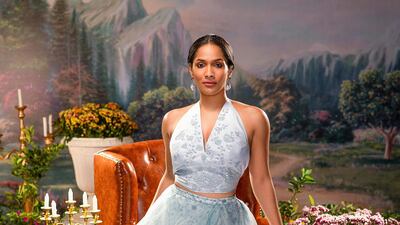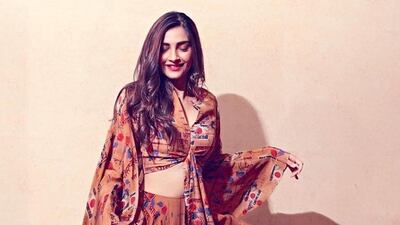A sari does not typically feature illustrations of cameras or lipstick tubes or handprints. Yet it was these icons, coupled with bold stripes and polka dots, that helped Masaba Gupta etch a name for herself on the Indian fashion design scene. Her distinctive block-printed saris in an array of neon and monochrome combinations mean Gupta may not be the first South Asian designer who comes to mind when one thinks of femininity in its most stereotypical sense; after all, delicate florals and muted palettes are not exactly her forte. So her latest collection, comprising lenghas with whimsical daisy-splattered patterns in pastel colourways, decorated with sequins and beadwork, are certainly unexpected.
Masaba Gupta x Rhea Kapoor
The Chronicles of Femininity is a collaboration between Gupta and Rhea Kapoor – a film producer, and stylist and sister to Bollywood's most fashion-savvy actress Sonam Kapoor. "Rhea and I have very similar styles in terms of the way we dress. It's all about oversized, boxy clothes, and we just took a complete U-turn and did something different," explains Gupta, who was in Dubai last month to launch her collection at the Vesimi store. "They're statement-making, but very relaxed. The whole collection is actually over-feminine by Indian standards and also by my standards, because I [prefer to] do bold work."
Bold is a look that the designer embodies exceptionally when we meet at Al Quoz Pond Park. Dressed in a black, boxy blazer paired with tapered black suit trousers and white and red Nike Cortez trainers, Gupta may not look the typical picture of femininity, but it’s a concept that’s deeply subjective, we both agree. “We’re telling people that we can be in a really pretty rose-print lengha and be feminine, and also be in an oversized blazer like this and be feminine,” she says.
Unconventional saris and lehengas
While the delicate florals may be a surprise, other elements of the collaboration are clearly stamped with Gupta's nostalgic-pop aesthetic. Saris feature bold chequered patterns with vintage-style printed and embroidered flowers, and are available with off-the-shoulder, bell-sleeved blouses. The duo's fresh take on this classic silhouette may well help attract millennials to a style that can be perceived as dated. "You don't have to wear it in the conventional state any more," the designer says. "You can wear it with leggings, sneakers or style it with a blazer – you can do anything today. Everyone can wear the sari because they can make it their own – it isn't stuck in a box any longer."
Championing the traditional silhouettes of the sari and lehnga, Gupta describes the collaboration as "a very India-proud collection, but at the same time, with lots of international sensibility". It has been designed as a trousseau collection – the customary wardrobe curated for South Asian brides. "When a woman gets married, she has more places to go to, from lunches and dinners to other events, so the idea was to help her build a wardrobe for those things, that aren't necessarily heavy [formal] pieces," the designer says.
Celebrating body diversity
Inclusivity is an issue the designer is hoping to tackle through this collaboration with Kapoor, saying they are on the same page when it comes to body diversity, and this is one of the messages portrayed in the new collection.
"We wanted it to be about women who have fuller bodies, who are not obsessed with the idea of being skinny," she says. Not only can pieces be made to measure, but they were also inherently designed with fuller and more realistic figures in mind. "There are more than enough pieces for different body types. As opposed to making you look a certain way, the idea is to celebrate your body as it is," says Gupta. "I think there's often this notion that big women don't like fashion or don't like to dress up, and Rhea and I wanted to change that because neither of us is 'skinny'."
Gupta has also used her platform beyond the realm of fashion and become something of a social media advocate for wellness and mental health, using Instagram to open up to her followers about struggling with adult acne and going to therapy. Gupta has also taken part in several green initiatives: in August last year, she collaborated with cosmetics brand Nykaa, selling products in eco-friendly packaging with her signature prints. Earlier this year, she joined forces with the United Nations Environment Programme in India to raise awareness and phase out single-use plastic with a collection – fittingly called I Will Wear Out Plastic – that celebrated sustainability. Gupta’s line featured detachable bags formed from the same fabrics as the garments.
Being a fashion designer puts Gupta – who is the daughter of Bollywood actress Neena Gupta and Antiguan cricketer Viv Richards – in a prime position to help bring about change, in a society that often promotes archaic standards of femininity. She says the most effective way to celebrate diverse bodies, cultures and races is to produce campaigns that display different interpretations of beauty. "The way we do it is we always use very interesting people in our campaigns, because seeing clothes on different people is the only way to understand they are made for different types of women," she explains. "That's the only way I find you can show people you're an inclusive brand."






